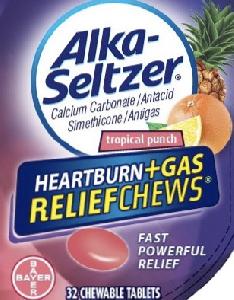Alka-Seltzer Heartburn + Gas ReliefChews Interactions
There are 225 drugs known to interact with Alka-Seltzer Heartburn + Gas ReliefChews (calcium carbonate / simethicone), along with 5 disease interactions, and 1 alcohol/food interaction. Of the total drug interactions, 13 are major, 159 are moderate, and 53 are minor.
- View all 225 medications that may interact with Alka-Seltzer Heartburn + Gas ReliefChews
- View Alka-Seltzer Heartburn + Gas ReliefChews alcohol/food interactions (1)
- View Alka-Seltzer Heartburn + Gas ReliefChews disease interactions (5)
Most frequently checked interactions
View interaction reports for Alka-Seltzer Heartburn + Gas ReliefChews (calcium carbonate / simethicone) and the medicines listed below.
- acetaminophen
- acetaminophen / hydrocodone
- Adderall (amphetamine / dextroamphetamine)
- albuterol
- Allegra (fexofenadine)
- allopurinol
- aspirin
- atorvastatin
- docusate
- famotidine
- fluconazole
- fluticasone nasal
- gabapentin
- ibuprofen
- loratadine
- melatonin
- metformin
- methocarbamol
- montelukast
- omeprazole
- pantoprazole
- pravastatin
- prednisone
- Tylenol (acetaminophen)
- Tylenol Arthritis Pain (acetaminophen)
- Tylenol Extra Strength (acetaminophen)
- Vitamin B12 (cyanocobalamin)
- Vitamin D3 (cholecalciferol)
- Zofran (ondansetron)
- Zyrtec (cetirizine)
Alka-Seltzer Heartburn + Gas ReliefChews alcohol/food interactions
There is 1 alcohol/food interaction with Alka-Seltzer Heartburn + Gas ReliefChews (calcium carbonate / simethicone).
Alka-Seltzer Heartburn + Gas ReliefChews disease interactions
There are 5 disease interactions with Alka-Seltzer Heartburn + Gas ReliefChews (calcium carbonate / simethicone) which include:
More about Alka-Seltzer Heartburn + Gas ReliefChews (calcium carbonate / simethicone)
- Compare alternatives
- Drug images
- Side effects
- Dosage information
- During pregnancy
- Drug class: antacids
Related treatment guides
Drug Interaction Classification
| Highly clinically significant. Avoid combinations; the risk of the interaction outweighs the benefit. | |
| Moderately clinically significant. Usually avoid combinations; use it only under special circumstances. | |
| Minimally clinically significant. Minimize risk; assess risk and consider an alternative drug, take steps to circumvent the interaction risk and/or institute a monitoring plan. | |
| No interaction information available. |
See also:
Further information
Always consult your healthcare provider to ensure the information displayed on this page applies to your personal circumstances.


